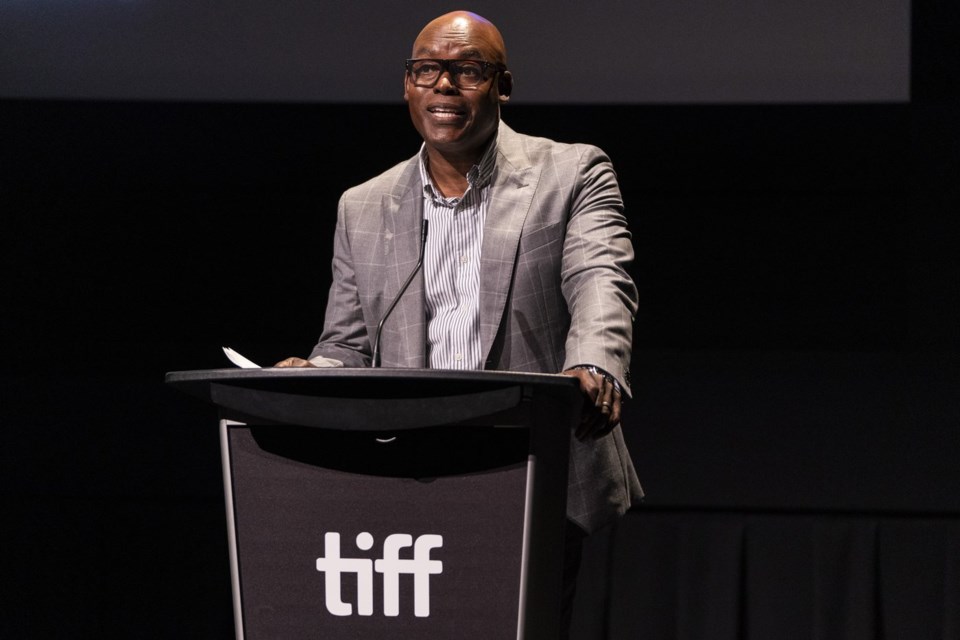TORONTO — The CEO of the Toronto International Film Festival is warning against an overly nationalistic approach to screen content in Canada, as U.S. President Donald Trump's looming tariffs have led some to shun American exports.
The Canada-first approach to film could ultimately harm the industry, Cameron Bailey said on a virtual call from Toronto on Thursday. He noted TIFF has been closely watching the trade tensions and their potential impact on the economy.
But beyond tariffs, which could increase costs for both filmmakers and festival organizers, TIFF is concerned about a potential “sentiment shift” among viewers and creators.
“That’s what we’re really keeping a close eye on: that difference between pride in Canadian screen stories and a kind of closing down and a purely nationalistic approach to screen content. I think that’s bad for Canada if it happens here, and it’s especially bad for Canadians if the U.S. decides to go that route as well,” Bailey said.
That shift doesn't appear to be happening in Canada en masse just yet. A Leger poll published this week found that while 81 per cent of Canadians have bought more Canadian-made products to protest Trump’s tariff threats, only 28 per cent said they have cancelled or plan to cancel their subscriptions to U.S. streaming services such as Netflix and Disney Plus, compared to 34 per cent who say they would not be cancelling.
Still, Bailey said he's hearing concerns in the local industry that an “excessively nationalistic sentiment” could provoke a similar response from the U.S., impacting Canadians who want to work across the border and turning Americans off of Canadian films and shows.
While it’s important for Canadians to take pride in their own content, he said, we have to make sure “we're not generating a kind of a mood south of the border where Americans only ever want to watch American things.”
He said he wants to see more Canadian success stories like CBC's "Schitt's Creek," which became a huge hit in the U.S. after debuting on Netflix.
“The Canadian screen industry and the U.S. screen industry should always be collegial and not adversarial,” Bailey said.
“We all know how many Canadians are prominent in the U.S. industry already, and it's worked really well to have a fluid border on that front.”
Last month, Trump named actors Sylvester Stallone, Jon Voight and Mel Gibson “special ambassadors,” tasked with bringing business conducted in “foreign countries" back to Hollywood.
Foreign projects made up 49 per cent of all film and TV production in Canada in 2023-24, generating $4.73 billion and 91,120 jobs, according to the Canadian Media Producers Association.
On Friday, TIFF announced the advisory committee members for its forthcoming content market, launching in 2026. They include Rhombus Media founder Niv Fichman, Elevation Pictures co-president Noah Segal and Indigenous Screen Office CEO Kerry Swanson.
Backed by $23 million in federal funding, the initiative will act as a hub for buying and selling Canadian and international film, TV and digital content.
Bailey said TIFF will draw on the advisory committee’s “deep knowledge” of the industry as it finalizes what the content market will look like.
He added that the market will ramp up TIFF's slate of industry conferences and private screenings, offering distributors, sales agents and buyers opportunities to view films beyond the main festival lineup and explore potential distribution deals.
TIFF will also introduce a space in its market where filmmakers and screenwriters can pitch in-development projects to potential partners and financiers, with the goal of securing the support needed to bring their work to completion.
With the market, Bailey wants the festival to simultaneously serve the needs of the moviegoers and movie makers, which he believes is key to "staying current."
"We want to build a crossroads between public audience engagement and the industry, and have this be the real meeting point every year," he said.
"That's something that doesn't quite exist. I don't see it quite anywhere else, even at the big European markets."
He said while festivals like Cannes or Berlinale are heavily industry-focused, "they don't have the public side like we do in Toronto."
Bailey said another goal of the market is to provide a bigger platform for Canadian creators who are already coming to TIFF to do business and meet people.
“We think if we're bringing more of the global industry to town, then we can actually bring the world screen industries to Canada's doorstep every single year,” he said.
Bailey said it’s “hard to say right now” how the impending tariffs would affect TIFF specifically, beyond the broader impact they might have on the Canadian economy.
“But I think what we can continue to do is to make sure that we are supporting the Canadian industry and supporting its engagement with the rest of the world — including our partners, and cousins, really, in the U.S.”
This report by The Canadian Press was first published Feb. 14, 2025.
Alex Nino Gheciu, The Canadian Press




